Death and Aging in NO COUNTRY FOR OLD MEN
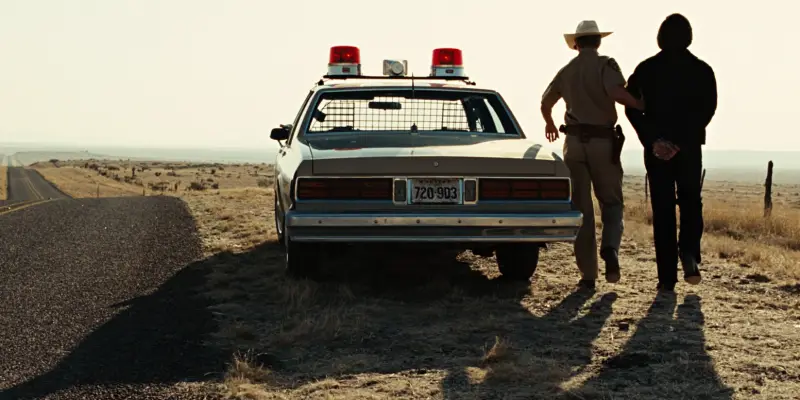
Jay is just a dude who takes in an unhealthy…
Joel and Ethan Coen‘s No Country for Old Men is a unique genre mash-up that contains elements of western, horror, drama, and crime films. The film follows the interwoven arcs of several characters in West Texas in the early 1980s.
While hunting, Lleyelyn Moss (Josh Brolin) comes across millions of dollars at the bloody scene of a drug deal gone awry. In charge of reclaiming this cash is a hitman named Anton Chigurh (Javier Bardem). Chigurh will stop at nothing to make sure Moss does not get away with what has been contracted to obtain. Meanwhile, Sheriff Ed Tom Bell (Tommy Lee Jones), who is very close to retirement, tracks the events surrounding the drug deal in an effort to apprehend any criminals at large and protect those who may be in danger.
The surface of the film encompasses the dangers (and often demise) encountered and perpetuated by those involved with the ramifications of the discovery of the bloodbath. Chigurh will stop at nothing to find and kill Moss, purely on principle for making him work so hard to get the money. Chigurh kills any threat in his way with ease, as if there are no greater ramifications for his actions.
Chigurh: The Shadow of Death
Moss tries to stay one step ahead, moving from motel to motel in an effort to lose Chigurh, but Chigurh is always able to find him. After being shot by the gun-for-hire, Moss flees to Mexico where he is offered protection by another hitman (Woody Harrelson). This hitman tells Moss that Chigurh is a relentless, unforgiving man who stops at nothing to perform the job he has been assigned. Moss declines the offer for protection and continues to flee.
He agrees to meet his wife to give her the money at another motel, and she sends Sheriff Bell out to protect her husband. However, Bell gets to the motel after it is too late, with Moss shot dead in his room. In the end, Moss and his wife end up dead, Chigurh is in a violent car accident from which he walks away, and Bell is left, retired, contemplating about the recent events and his life in general. He sits at home describing dreams he has had about his father, and the screen fades to black.
No Country for Old Men is a film about the unfortunate discovery of drug money, the attempts to kill the unwitting discoverer, and a police officer’s search for justice for the ruthless murderers put in charge of getting the money back.
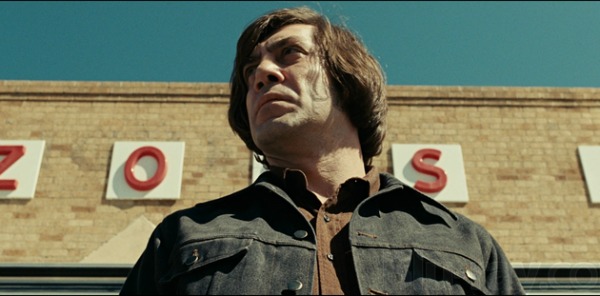
On a deeper level, we see interpretations of the nature of death and its strange beauty. One of the many subtextual meanings of No Country for Old Men is that Anton Chigurh is an embodiment of death and its inevitability. Chigurh plods along confidently throughout the film, never giving the slightest sign of distress. He remains stoic and collected at all times.
We see a prime example of this early in the film when he is in custody at a small jail. He calmly approaches the arresting officer and chokes him to death with his handcuffs in order to escape. While the two men are writhing around on the ground as the officer slowly loses air and his throat squirts blood, Chigurh has a vague smile on his face, before casually walking out on his own terms.
The constantly emotionless actions of Chigurh display the coldness of death. Death, like Chigurh, does not discriminate. Very often, the time of one’s demise is purely chance, much like the flip of Chigurh’s signature coin. One half rotation less or more, and the outcome is completely different. The seemingly inconsequential elements of life all culminate to decide one’s ultimate fate.
It is only when the characters of No Country for Old Men fight Chigurh that their death is guaranteed. We see this in the instances of Llewelyn Moss and his wife, the Mexican cartel members encountered in the motel, and fellow hitman Carson Welles. Obviously, Moss fights death because he believes he can outrun it, motivated by the millions of dollars he found in the desert, but in the end, he is just another tally mark on Chigurh’s kill count.
Additionally, his wife fights death by refusing to bet her life on Chigurh’s coin flip. Having already lost her husband and her mother (who lost a battle with cancer), Carla Jean stares death in the face and decides that she will not play these games with her life. After this refusal to play, the film cuts to Chigurh walking outside and checking the bottom of his boots (presumably for blood). He forgets about the murder as easily as he brought it to be.
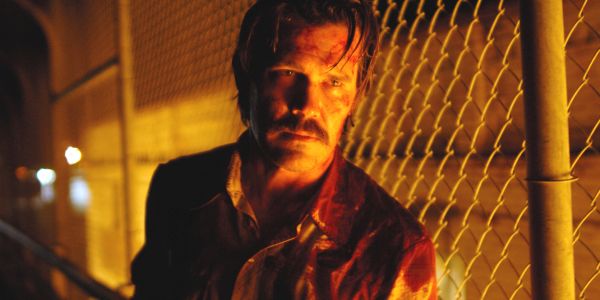
It is important to note that the deaths of Llewelyn and Carla Jean are not explicitly shown on screen. The deaths are not portrayed as grisly or disturbing, but, to the viewer’s eye, they both leave peacefully, as if there is some gentle beauty to death. Yet, this also shows that death is not some grand event and one death is no more important than another. Most of the deaths that are shown on-screen are those of men involved in the drug trade or his fellow hitmen, almost as if they were asking for death the whole time. There is no dignity to their deaths, no beauty or sense of redemption as there is with the deaths of Llewelyn and Carla Jean.
In Chigurh’s last scene of the film, he is involved in a severe car wreck. The driver in the other vehicle is unable to get out of his vehicle. Chigurh suffers a broken arm, but fairly nonchalantly walks out of the car and uses a young boy’s shirt as a sling. He walks away, knowing that this will not affect him, for he is death and death is unstoppable. While he is in pain, death will continue to carry out his will. The young boy is spared in his confrontation with death because he has a full life ahead of him.
In fact, he is rewarded for assisting him in the form of a large amount of cash. For death, money has no meaning. He was hired to obtain the $2 million that Llewelyn took, but he was not interested in it, he had simply decided that Llewelyn’s time had come. When Chigurh is hired to kill someone, their fate has been sealed. On principle, he will not stop until his target is dead. Death does not wait for anyone: it follows you wherever you go.
Bell: Days Gone By
Often overlooked in No Country For Old Men is the character of Sheriff Ed Tom Bell (Tommy Lee Jones). Bell carries the most emotional weight of anyone in the whole film. In the end, No Country For Old Men is a story about him. In trying to uncover the truths about the case and deliver justice to those who deserve it, he realizes many things about the nature of aging and the implications of younger generations taking over.
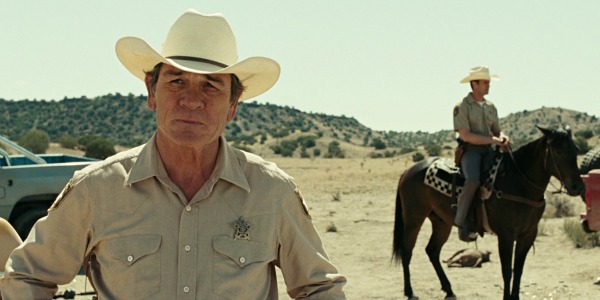
An ideological meaning of No Country for Old Men is the idea that as men grow older, they become outdated. As adulthood progresses, men are no longer able to adapt to the changes around them and new generations are simply one step ahead because they understand the new ways of the world. At the beginning of the film, Bell reflects on his career as a sheriff as retirement looms. He is proud of what he has done as a sheriff but it has also worn on him. He mentions that some old sheriffs never even carried guns, a fact that baffles people in this modern age. his is the first example of a generational gap talked about in the film. It is only with retirement imminent that he realizes that every man experiences these generational gaps as he grows older.
Throughout the whole case of the missing money, Bell is one step behind Moss and Chigurh. These men think differently than the men he grew up around. He sees them as ruthless and doesn’t understand their motivations. Near the end of the film, Bell visits an old cop named Ellis and explains that he feels “outmatched” by this new case. The changing world around him is overwhelming and he feels as though he is at the mercy of this new way of life.
Ellis quickly dismisses this notion, saying, “Watcha got ain’t nothing new. This country’s hard on people, you can’t stop what’s coming, it ain’t all waiting on you. That’s vanity.” This is a feeling experienced by everyone as they grow older. To feel sorry for yourself when it happens to you is selfish, unbecoming, and naïve.
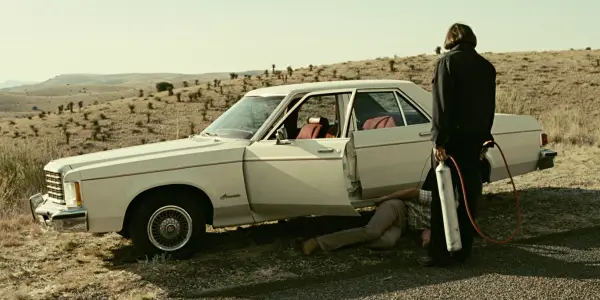
With all that Bell has seen by the time the case is over, a feeling of numbness has washed over him. Llewelyn and Carla Jean are dead because he wasn’t able to solve the puzzle of the younger generation. But this is something that he has accepted and he tries to move on from in retirement. Now that the end of his law enforcement career has come, he knows the next big event in his life is death, and he subconsciously begins to contemplate that reality. Much like in his dream, Bell will soon be following his father into the proverbial darkness. With all the unfamiliar evil in the world, this is not the worst thing that could happen.
By the end of the film, Bell looks completely drained and his wife must work hard to get any sort of conversation out of him. In his heyday, he knows he was a great police officer, but the world has passed him by and the rules are different now. They are rules that he has been unable to learn due in part to stubbornness, unfamiliarity, and simply not wishing to partake in a game that does not value the same things he does.
Every generation longs for the days when they were the ones in control of the broad decisions. When the people they knew made the rules. But that time invariably comes and goes. The title sums up Bell’s revelation quite nicely. This country truly is not made for the likes of the old.
On A Final Note
No Country for Old Men simultaneously views death as frightening and beautiful, worrisome but inevitable. The Coens believe that death can be a welcome end to a well-lived life. It is important to accept death and not fight it, because that is when it hurts the most. That is exactly what Sheriff Ed Tom Bell has done in the film. He is thrown into the perceived darkness of the new generation, but comes out knowing that his experience is no different than anyone else’s.
Every man sees his culture replaced by someone else’s. New generations come into power. The elderly are left with a set of outdated principles that often do not align with this new set of ideals. Bell’s last case is perhaps the darkest and most disturbing he has ever worked, but it is not one he wishes to forget. Through the brutality of Anton Chigurh, Bell has found solace in the passage of time. Just as a generation becomes outdated, so, too, does that generation die off. But one cannot resist or dwell on this fact. After all, death could come from something as trivial as a coin flip.
What do you think Anton Chigurh represents? Where does No Country For Old Men rank in the list of Coen Brothers films for you?
Does content like this matter to you?
Become a Member and support film journalism. Unlock access to all of Film Inquiry`s great articles. Join a community of like-minded readers who are passionate about cinema - get access to our private members Network, give back to independent filmmakers, and more.
Jay is just a dude who takes in an unhealthy amount of media of all types. Currently living in Atlanta, Georgia, he firmly believes that all movie theaters should have leather recliners, you eat popcorn too loudly, and if you don't put that cellphone away in 2 seconds you will learn the definition of frontier justice.













